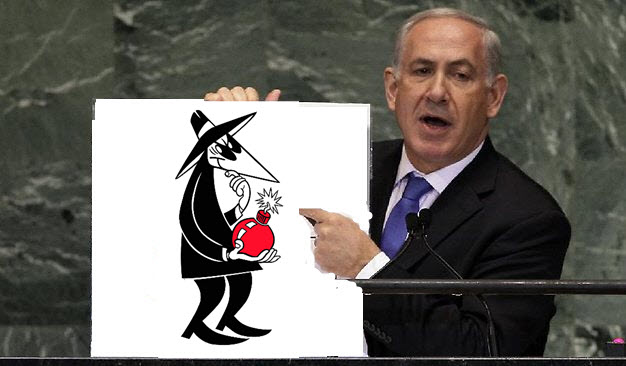Will Iran Deal Spur Israel-Palestine Peace Process?
Netanyahu's bomb meme

NEW DELHI: After the Iran Deal, the Israeli government which is now asking for more foreign aid, does understand that its benefactor United States is slowly trying to mitigate the year-long geopolitical hurdles in West Asia. But would placate the Israel-Palestine peace process be one of them?
“It won’t be simple but the United States could persuade Israel that its security interests are better served by ensuring justice for the Palestinians and promoting regional goodwill,” says lawyer Ronald Benjamin.
There are several issues which have still caught the Israel-Palestine peace process at doldrums. Firstly, the borders of Israel or the capital is not fixed, with the settlement process continuing at the highest scale. Secondly, the Palestinians in Gaza, for example, have witnessed the worst of man-slaughter in the past few years where justice has been denied and in spite of Palestine going to the International Criminal Court, not much has been achieved. Thirdly, the entire geopolitical position of Jerusalem and how it should be divided in between the Palestinians and the Jews is controversial. Fourthly, and most importantly, the two-state solution is not at all feasible and Israel is very belligerent towards adopting its one Jewish state, which though is contradictory with the democratic identity. Fifthly, the peace process will also have to deal with the presence of Israeli Arabs in Israel and what kind of livelihood they live on, which particularly has been very abysmal as revealed by scholar Ben White in numerous works.
Called “Two States - One Homeland”, the group, led by Israeli journalist Meron Rapoport and Palestinian politician Awni Almashni, is advocating the creation of an Israeli-Palestinian confederation. They say that their plan, now picking up public and official backing, can solve the difficult issues - Israeli settlements, the right of return for Palestinian refugees, and the fate of Jerusalem - that have scuttled past negotiations.
The “clinical death” of the Oslo Peace process, inaugurated by Israeli Prime Minister Yitzhak Rabin and Palestinian leader Yasser Arafat in 1993, and increasing violence “bring fertile ground for new ideas,” said Mr Rapoport, a veteran journalist based in Tel Aviv.
Bar Ilan University political scientist Menachem Klein, a veteran of Israeli-Palestinian negotiations, is more skeptical. Not only is the initiative less detailed and enjoys less international support than the two-state solution, he said, but the idea of allowing Jewish settlers to remain in the West Bank in return for letting Palestinian refugees settle in Israel is unpopular.
The settlements are considered illegal under international law, though Israel disputes this. UN General Assembly resolutions, meanwhile, endorse a Palestinian right of return.
“For the Palestinian public it is difficult to accept this exchange,” he added. “It’s hard for me to accept it.” Mr Almashni, while not legitimising the settlements, is pragmatic.
While Netanyahu clearly stated “There is a great shift taking place...we used to think that if we solved the Israeli-Palestinian conflict, it would solve the larger Israeli Arab conflict. The more I look at it, the more I think it may be the other way around. That by nurturing these relationships that are taking place now with the Arab world, that could actually help us resolve the Israeli-Palestinian conflict, and we're actually working towards that end.”
Frankly, the discourse of Arab-Israeli conflict does not continue anymore. Firstly, most of the Arabs have themselves abandoned the Palestinians, very strategically to suit their own interests. Secondly, many Arab states have started developing tacit alliances with Israel in espionage, defense and technology starting a new era of neo-liberalism. Thus, the Palestinian cause has lost its momentum, in spite of what we see now, as the third ‘leaderless’ Intifada going on.
Nevertheless, the Iranian Deal was a major ice-breaker. US played a pivotal role and turned the tables. But chances of US involving much in the Israeli-Palestinian dispute are very less, especially because in the past few years, US has been trying to lessen down its leverage in West Asia. But yes, with the change of government, new policies and negotiations can take place.
(The writer is a doctoral student at JNU, New Delhi)



